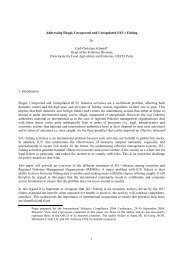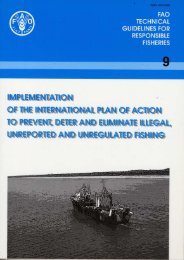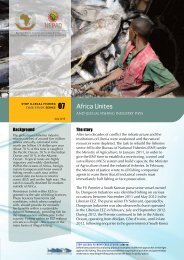Pirate Fish on Your Plate - International MCS Network
Pirate Fish on Your Plate - International MCS Network
Pirate Fish on Your Plate - International MCS Network
Create successful ePaper yourself
Turn your PDF publications into a flip-book with our unique Google optimized e-Paper software.
Recommendati<strong>on</strong>s<br />
10<br />
The implementati<strong>on</strong> and enforcement of a suite of inter-related measures are required to stop pirate<br />
fish entering the EU, and to eradicate IUU fishing. EJF c<strong>on</strong>tends that failure to adopt the measures<br />
highlighted below will result in a rapidly deteriorating situati<strong>on</strong>, including declines in commercial<br />
catches, marine biodiversity and impoverished livelihoods in some of the world’s poorest nati<strong>on</strong>s.<br />
It is also clear that these steps are vital to protect the European public from potential health impacts,<br />
and from unwittingly c<strong>on</strong>tributing to the devastating impacts of IUU fishing.<br />
1. Closure of Ports of<br />
C<strong>on</strong>venience – Las Palmas<br />
“Surveillance <strong>on</strong> the dock is important, we need to shut out illegal<br />
fishers in ports, where they stop to refuel, take <strong>on</strong> supplies, make<br />
repairs or off-load their catches in what are now more comm<strong>on</strong>ly<br />
known as ‘ports of c<strong>on</strong>venience’…As IUU fishers have less and less<br />
access to port services – and to the markets reached through ports –<br />
profits will drop, and the incentive to perpetuate illegal activity starts<br />
to disappear. We need to hit IUU fishers in the pockets and this is<br />
<strong>on</strong>e of the more effective means of doing that.” Judith Swan, FAO<br />
<str<strong>on</strong>g>Fish</str<strong>on</strong>g>eries Department 94 .<br />
The EU and its member states must close their ports to vessels<br />
engaged in IUU fishing as well as to vessels transporting illegal<br />
catches, or their support vessels. EJF acknowledges that Las<br />
Palmas is not the <strong>on</strong>ly European port with culpability in the<br />
IUU fish trade, and it is therefore essential that all European<br />
harbours enforce anti-IUU fishing measures.<br />
To this end, the EU should:<br />
• Review and strengthen the basis up<strong>on</strong> which port authorities<br />
can undertake investigati<strong>on</strong>s into fishing vessels docking and<br />
offloading fish into their harbour. Authorities should be<br />
empowered to undertake greater oversight of fish catches,<br />
and have greater access to informati<strong>on</strong> that will determine<br />
their provenance and legality.<br />
• Adopt legally binding measures as provided for in the FAO<br />
model scheme for port c<strong>on</strong>trol, and ensure that sancti<strong>on</strong>s<br />
can be brought against port states for failure to c<strong>on</strong>trol their<br />
ports with regard to IUU activities.<br />
• Use the West Africa Regi<strong>on</strong>al Surveillance Operati<strong>on</strong>s<br />
Co-ordinati<strong>on</strong> Unit (SOCU) database of IUU vessels to<br />
deny them access to Las Palmas and other EU ports.<br />
Access to EU ports should be restricted to vessels that<br />
have dem<strong>on</strong>strated themselves to be fishing in a resp<strong>on</strong>sible<br />
manner, in compliance with c<strong>on</strong>servati<strong>on</strong> and management<br />
measures and legislati<strong>on</strong>. Such ‘white lists’ put the burden of<br />
proof <strong>on</strong> the vessel operators, there by helping to reduce<br />
costs of m<strong>on</strong>itoring efforts.<br />
• Support the development and implementati<strong>on</strong> of the<br />
proposed UN internati<strong>on</strong>al agreement 95 establishing<br />
c<strong>on</strong>trol measures in ports where fish is landed,<br />
transshipped or processed.<br />
2. Vessel black lists<br />
The EU should:<br />
• Strengthen its technical and financial support of RFMOs,<br />
giving them the capacity to more effectively c<strong>on</strong>trol their<br />
own waters. In particular, the EU should promote the<br />
creati<strong>on</strong> of a publicly available ‘black list’ of vessels involved<br />
in IUU fishing in West Africa, which can be used to expose<br />
unscrupulous operators and deny them fishing licences and<br />
access to port facilities.<br />
• Take acti<strong>on</strong> to prevent any vessel that appears <strong>on</strong> a black<br />
list from being able to supply Europe with fish by giving<br />
DG SANCO the authority to remove it from their list of<br />
authorised vessels. This simple, inexpensive and potentially<br />
effective strategy has been recognised as such by the<br />
Committee <strong>on</strong> <str<strong>on</strong>g>Fish</str<strong>on</strong>g>eries draft report 2006/2225(INI) 96 .<br />
For companies that own multiple vessels, increased scrutiny<br />
<strong>on</strong>ce a history of IUU fishing am<strong>on</strong>gst individual ships within<br />
their fleet has been established would act as a further<br />
deterrent to IUU fishing activities.<br />
3. Vessel Identificati<strong>on</strong><br />
The EU should support moves towards regi<strong>on</strong>al and global<br />
databases that provide greater transparency in the identificati<strong>on</strong><br />
of fishing vessels, and informati<strong>on</strong> <strong>on</strong> current and previous vessel<br />
names and flags, owners and beneficial owners, country of<br />
ownership, call sign, t<strong>on</strong>nage etc.<br />
4. Compulsory Vessel Markings<br />
The EU should enforce FAO guidelines and require that all<br />
vessels entering ports clearly display their name.<br />
19

















